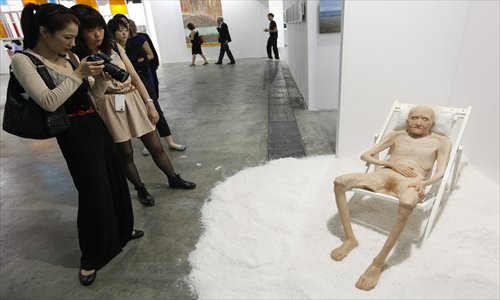High expectations for HK art scene
Li Wei's work at Art HK Fair 2012

The eyes of the global art world are fixed on Hong Kong - for now.
Hong Kong's art scene has been expanding for the past few years, but the recent flurry of high profile international gallery openings alongside the city's annual art fair has brought a hype and frenzy unlike anything seen before.
But it also comes at a time when China's market is slowing, raising concerns about sustainability.
Auction house Sotheby's official opening of its 15,000 square foot gallery space last Friday comes after blue-chip galleries such as London based Simon Lee, Shanghai's Pearl Lam, Parisian dealer Galerie Perrotin and Paris gallery NeC opened earlier this week.
Hong Kong's Art HK fair, now owned by international art show Art Basel, which also holds an annual show in Miami, has attracted close to 70,000 people. Sales for the fair have been strong and expectations for the next two days are solid, said dealers.
But even though art excitement appears palpable in the financial city, local gallerists and international art consultants are warning that the market feels a little frothy.
"While this hype brings an air of excitement to the city's art scene, it's very telling of the possible fragility of the market and whether it's sustainable," said Natasha Whiffin, gallery manager at Saamlung in Hong Kong.
The rate at which galleries have set up shop here is almost unheard of in the recent history of world arts hubs such as London, Paris, New York, she added.
Market research firm ArtTactic said in its May 12 report that confidence in the Chinese contemporary art market is slowing down after three years of rapid growth.
"The biggest change from 12 months ago, is the decrease in confidence at the very high end of the market," said the London based agency.
High expectations
Simon Lee and Pearl Lam's galleries, that recently opened in Hong Kong's historic Pedder building, joined American art dealer Gagosian, which opened in 2011, and British gallerist Ben Brown, who set up in the colonial etched building in 2009.
Yet dealers have warned that the flood of galleries which have headed eastwards ought to scale back expectations that growth will remain as robust as it has been.
"I think there will be quite a lot of disappointment. If we expect that things will grow like hell, I don't really think so," said Urs Meile, who represents artists including Ai Weiwei and Li Dafang, and operates Galerie Urs Meile in Switzerland and Beijing.
"If you look long term, it will be a good market, but I am not that sure it will grow fast," said Meile, standing in front of Ai Weiwei's Cong being exhibited at Art HK.
Cong, which consists of 123 framed letters from various Chinese government ministries regarding Ai Weiwei's investigation of the 2008 Sichuan earthquake, is among the big name pieces being exhibited by the 266 galleries participating.
Commitment
Art Basel's name has increased credibility for the Hong Kong fair and attracted a higher caliber of international galleries and buyers, but the domestic art market remains very small and the city is a vastly different place when the fair closes.
"They have to rely on the Asian market to be the ones who are buying here, and I am not sure that the Asian market is quite yet there to absorb this kind of material," said Michael Frahm, director of Frahm Ltd and an art adviser based in London.
While Chinese buyers make up over 40 percent of the global auction market they have not been buying from individual galleries, said Frahm, adding that it will take a lot of hard work to get to know the collector base and know the scene.
For now, Hong Kong seems the place to be for art and culture lovers with 55 pieces of Picasso's original works on show from May 19 to July 22 at the city's heritage museum.
"There are a lot of people interested, but it's very early stages in that people are still very insecure in terms of what they are buying," Frahm said.